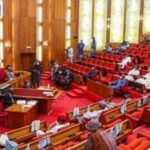By FRANCIS OGBIMI
I AM usually embarrassed listening to leaders in state and federal governments, business men and women, lawyers, intellectuals, others, beg and cry for capital investments, especially Foreign Direct Investments, FDIs, every hour, every day in Nigeria. Some state governors travel to Europe, America and Asia to beg Europeans, Americans and Asians to come and invest in their states.
I wonder why adults should behave the way Nigerian leaders in government do in relation to seeking capital investments. This article is written to demonstrate that Nigeria’s suffocating debts are consequences of lack of understanding of the science of the development of a nation and undue emphasis on capital investment – the erection of infrastructure, using historical and logico-mathematical evidence. It is obvious that European, American and some Asian nations are industrialised whereas African nations are pre-industrialised.
If Nigerian leaders were wise, they would try to find out how the non-African nations became industrialised. No, that is not for the Nigerian leader. Nigerian leaders are assuming that knowledge about what other nations did in the past is not important. Also, Nigerian leaders think that Nigeria does not need to understand the industrialisation process before embarking on it.
They believe that seeking FDIs in a most ridiculous manner and awarding inflated contracts for erecting structures is the sure way to achieving rapid industrialisation and development. They are very wrong. Africans unwisely talk of technology transfer, especially FDIs. Which nation developed through FDIs? Who transferred technology to Britain – the first nation to achieve the modern Industrial Revolution, IR? Britain like all other industrialised European nations was an agricultural nation for about 2000 years. When Britain became the manufacturer of innumerable scientific and technological products, she must have acquired the capabilities for manufacturing many scientific products. How are capabilities (competences) acquired?
All persons are born as crying babies. The baby soon begins to babble (learns how to talk), acquires the competences to talk and talks. The baby who could not babble grows up to be a dumb-adult. Talking or speaking is a skill (Hurlock, 1972). The child must also learn how to read and write, otherwise it grows up to be an illiterate. No one or nation is born with the skills to produce.
All knowledge, skills and competences are acquired through learning (education, training, employment and research). One who wishes to be a good dancer must learn how to dance. A nation which hopes to manufacture many products must develop the people to manufacture them. The talented pianist must play the ordinary tunes before using his talents to compose extra-ordinary tunes.
Learning and acquiring new knowledge, skills and competences and applying these in solving problems, including production, are the primary sources of achieving sustainable economic growth and industrialisation, SEGI. Learning results in relatively permanent changes in knowledge, skills, experience and other behaviours (Klausmeier,1985). Learning progresses from the novice position to the expert’s position (Stahl,1990). The intrinsic values of the learning-man and learning-woman appreciate in a compound fashion with learning intensity and time. Thus, when a person commences an educational or apprenticeship scheme, he or she begins from the lowest or novice position.
Usually, at the end of the first year of learning, the learning-person is promoted to the second level, having learnt the things scheduled for level one. At the end of the second year, the learning-person again, is moved to level three. The growth achieved this way is sustainable. The learning person builds-up capabilities or competences. That means, his/her ability to do things, including production, increases as long as he/she continues to learn. So it is too for a nation. A learning-nation achieves SEGI, not GDP-growth, not growth without development, GWD.
The intrinsic value of the learning-person can be expressed in a quantitative manner. A nation which emphasises learning continuously builds-up knowledge, skills and competences, KSCs. As the learning process continues, a point is reached where each type of KSCs begins to enjoy the supportive impact of all others and all of them form an invisible KSCs-network, a sort of problem-attacking front. The nation at that point achieves Industrial Revolution, IR – a technological puberty.
Productivity improves dramatically, the nation achieves economic diversification – various sectors of the economy begin to perform efficiently and effectively. The economic transformation described as IR, may be likened to what the spider achieves when it combines many of its silk-threads to make its web. The single silk-thread which the spider spins, is a relatively weak structural material which fails readily under any stress regime. However, the web which it makes from the combination of many of the weak silk-threads catches the small creatures on which the spider feeds. In a like manner, no individual solves the problems of a nation, but a combination of many millions of knowledgeable, skilled and competent people transforms an agricultural nation into an industrialised one.
Our quantitative analyses showed that the variables for planning for industrialisation are: 1) N – the number of people involved in learning/productive work and employment in a nation; 2) M – the level of education/training of those involved in productive activities in the economy and of the people of the nation; 3) L – the linkages among the knowledge, skills, competences and sectors of an economy; 4) r – the learning rates or intensity in the economy and especially among the workforce; and 5) n – the experience of the workforce and the learning history of the society.
All these variables are related to the learning-man and learning-woman. Moreover, the higher are the values of the variables, the better is the economy. A national growth measurement based on some or all of these variables would reflect the true economic situation in the nation. Those who do not understand the science of industrialisation measure GDP-growth or GWD.
Prof. Ogbimi, an economist, wrote via fogbimi@yahoo.com
The post Mounting debts: Undue emphasis on capital investments appeared first on Vanguard News.





